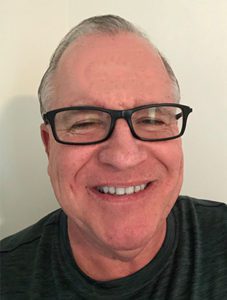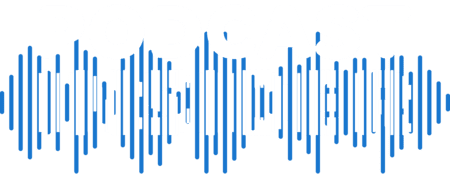 It’s back-to-school time! Our August Podcaster of the Month is a longtime educator who is dedicated to spreading his knowledge in the classroom – and far beyond – via his podcast Audibly Speaking: Listening to History. Rick Reiman is a Professor of History at South Georgia State College. He launched his podcast in October 2018 and has published 267 episodes. He earned his Ph.D. in History in 1984, and has published on the subjects of the New Deal and the assassination of John F. Kennedy.
It’s back-to-school time! Our August Podcaster of the Month is a longtime educator who is dedicated to spreading his knowledge in the classroom – and far beyond – via his podcast Audibly Speaking: Listening to History. Rick Reiman is a Professor of History at South Georgia State College. He launched his podcast in October 2018 and has published 267 episodes. He earned his Ph.D. in History in 1984, and has published on the subjects of the New Deal and the assassination of John F. Kennedy.
Reiman teaches a course in Modern Western Civilization, in which the entire course is taught with an Open Educational Resource textbook and 30 podcast lectures of less than 15 minutes each, hosted on Blubrry. He has published an article in a scholarly journal on the use of podcasting as a pedagogical tool in online courses based on this experience. Students are provided the resource for free and can listen to the episodes while on the go, as well as repeat the listening experience at will. Reiman has found that the student scores for the course with podcast episodes are slightly higher than in the courses used as comparators.
- Your podcast blends readings of historical fiction – Arthur Conan Doyle is a favorite I noticed – and fact, as well as modern topics that are impacting history. What inspired you to design this approach?
I have a special interest in audio narration. My professional expertise is in the field of Recent American history, in which I hold a Ph.D. On the one hand, I like to record classic books that are no longer in copyright in order to hone my skills as an audio narrator, for purely personal reasons. I feel that I am doing better as an audio narrator because of these repeated recordings and I enjoy doing them. I especially enjoy seeing, thanks to Blubrry statistics, how many “clicks,” and from where in the world I get for some episodes as opposed to others. I enjoy speculating on the reasons and this also helps me improve my audio narration skills, I think.

On the other hand, I record the results of recent historical research because I want to spread the word on what historians think is important in American history, and how that research can guide us through the stresses and strains of our present political moment. Between the Sherlock Holmes stories and the historical reflections, the result is a potpourri of quite different programming. Since the Conan Doyle stories are set in a particular time frame, they too fit the bill of historical documents, and they are copyright-free of course, thus lending them well to audio narration. Conan Doyle, who was also a doctor, modeled the Holmes character on a mentor of his, who had the intensity of focus and ethical excellence of autistic persons of his day and ours. I am fascinated by this aspect of the Holmes character, that his skills and nobility sprang from his eccentricities, and seek to help listeners today understand that it is the main character and his characteristics and not just the puzzles of the Holmes stories that are particularly interesting.
- Why do you think it’s important for people to learn about history, and how do you believe podcasting promotes this education?
We know that we can’t understand ourselves with an understanding of our own individual backgrounds and pasts. Why is it any different for the nation and culture which surrounds us and determines our possibilities and challenges? As citizens of a democratic Republic, we have a responsibility to understand our problems when we make decisions about them. History, more than any other subject, helps us to do so. Podcasting is accessible. Sound is one of the liveliest arts. People live by stories. Podcasting is essentially the telling of stories. I believe that they are useful. I hope that they are also enjoyable.
- In what ways can understanding history help us make better sense of the present, and what strategies can you recommend to convey that through podcasting?
Human nature never changes. Therefore, by looking at the history of people like ourselves, who lived in past times, we can see over their lifetimes how they succeeded and often failed to overcome challenges that face human beings like ourselves. We can learn from those failures (what not to do) as well as successes. History never repeats itself–the notion that it does is a fallacy. But there are enough things that do not change–people’s desire for love, acceptance, power, ambition and so much else–that history provides a set of insights and considerations, not an exact road map, for our future course as individuals. Podcasting is not just a story-telling art. It imposes a requirement that the story be told in a limited time frame. People’s attention spans are growing shorter and shorter. The already-educated read long books. Podcasting reaches the educated and the would-be educated alike.
- Can you tell us about a particular historical event or figure that you find especially fascinating or inspiring (Sherlock Holmes, perhaps?) and why that is?
I already mentioned why I think that Sherlock Holmes deserves more attention. But, since so many of my episodes are readings of the Holmes short stories, I will say more. (By the way, I have also recorded the entire novel, The Hound of the Baskervilles, and not just the short stories, on my podcast.) Although a fictional character, Holmes was modeled after Doyle’s real-life teacher, Dr. Joseph Bell. Holmes was the archetype of a model citizen. He helped poor clients more than the rich, loved to give the snobbish and the wealthy their comeuppance, and was devoted to both justice and the imperatives of his craft. Many characters in the stories underrate Holmes and insult him for his peculiarities, but he confronts these insults with quiet dignity and uses them to his advantage to solve his cases. He is really quite inspiring and Doyle is such a marvelous writer, making his points with brilliant concision.
- How do you hope your podcast will impact listeners and inspire them to learn more about history, and what strategies have you found to be successful to engage and connect with your audience on this topic?
Given that there are hundreds of thousands (millions?) of podcasts out there, the episodes have to be very interesting or at least enjoyable in order to gain a listening audience. The first thing I care about is that the episode be enjoyable, although it may not seem so from the title. I hope that people enjoy them. If people like one episode they are likely to sample another. That said, I probably would have stopped recording these episodes if my main goal was to impact people. I have no evidence that anyone has listened to an entire episode of any of my hundreds of episodes. I have never received an email from anyone indicating that they enjoy my podcast. I do not infer from that, that few do. I simply do not know. So, yes, I hope my podcast episodes have impact and are enjoyed. I continue to make them in part because of that hope, but also because of the essential fact that I enjoy producing them and believe that it makes me more skilled at audio narration and just basic reasoning. To paraphrase Sherlock Holmes, my work is my own reward.
Stay tuned! We’ll be talking to Richard on Podcast Insider about podcasting and Audibly Speaking: Listening to History.





